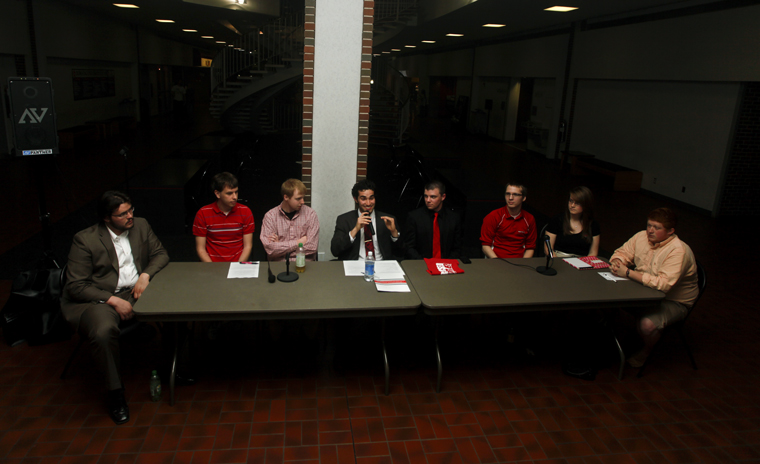SGA executive candidates explain platforms
March 25, 2011
UPDATE: President Colton Jessie told the Herald on Friday that SGA elections have been postponed a week and will now be April 5-6.
Candidates for next year’s Student Government Association executive positions shared their campaign platforms on Wednesday in a public debate in Downing University Center.
Candidates for SGA President
Diego Leal Ambriz
Leal Ambriz has been a member of SGA since he was elected a student senator last fall. He said WKU has done so much for him, and now he wants to give back.
One of his main ideas is to promote exercise on campus. He said he would like to bring P90X classes to the Preston Center for students.
“It’s important that we get committed to a healthy life, and by doing P90X we can do that,” Leal Ambriz said.
He also hopes to improve the recycling at off-campus housing.
“There is so much of an opportunity to recycle at many of the off-campus apartments,” he said. “Anything will make a difference.”
His other ideas include increasing the number of bikes that are available for students to rent, as well as making designated smoking areas for students on campus.
Billy Stephens
Since joining SGA in the spring of 2009, Stephens has worked with organizational aid before being appointed director of academic and student affairs in the fall.
Stephens’ biggest goal is to start a “Dead Day” where classes will be canceled for the last day or two before finals to give students more time to prepare.
“I think it is unfair that some students don’t have a lot of time to study,” he said. “A lot of other schools do it, and I don’t see why we can’t do it as well.”
He also hopes to improve the Provide-a-Ride service, which he said has not been as dependable this year as it has in the past.
“Provide-a-Ride is one of SGA’s signature services, and we have kind of neglected it,” he said. “I plan on working out a better contract with them to either get a fixed route or more buses to transport students.”
Stephens also said he hopes to improve SGA’s public relations campaign to spread awareness about the organization.
Candidates for SGA Executive Vice President
Kendrick Bryan
Bryan, a graduate student who would serve SGA for a full year, hopes to be elected as executive vice president for a third straight term.
He said his goal is to continue to improve SGA’s outreach.
“I have volunteered at (Academic Transitions Programs) and worked international student orientations, and I want to see more of SGA out there,” he said.
He also hopes to put iPads in the Educational Resource Center and Apple TV in the Technology Resource Center.
Bryan said that even though he’s done this job before, he still has ideas.
Katie Stillwell
Stillwell, a senior who plans to graduate in December, served as secretary this past year in her first year on the executive branch.
She said she would like to see more communication with not only South Campus, but also with the satellite campuses.
“South Campus is just a hop and a skip away, and sometimes it doesn’t feel like we include them,” she said.
She also hopes to reach out to other student groups on campus.
Stillwell said she is a proponent of making the most of SGA’s resources, especially amid university-wide budget cuts, rather than pushing ideas that will cost too much.
Candidate for SGA Administrative Vice President
Devon Hilderbrandt
Hilderbrandt will be running unopposed for administrative vice president after serving as Wade Pierce’s co-chair for organizational aid this year.
He said he sees himself as the “backup” to the president and executive vice president.
“They can come to me with a problem, and I can give them input and help them establish what they need to get done,” he said.
More than half of SGA’s budget goes toward the organizational aid fund and the scholarship fund, and Hilderbrandt hopes to use the other portion of the money to give back to the campus.
“They expect us to make the right decisions as elected officers, so they deserve for us to give back in whatever way we can,” Hilderbrandt said.

























